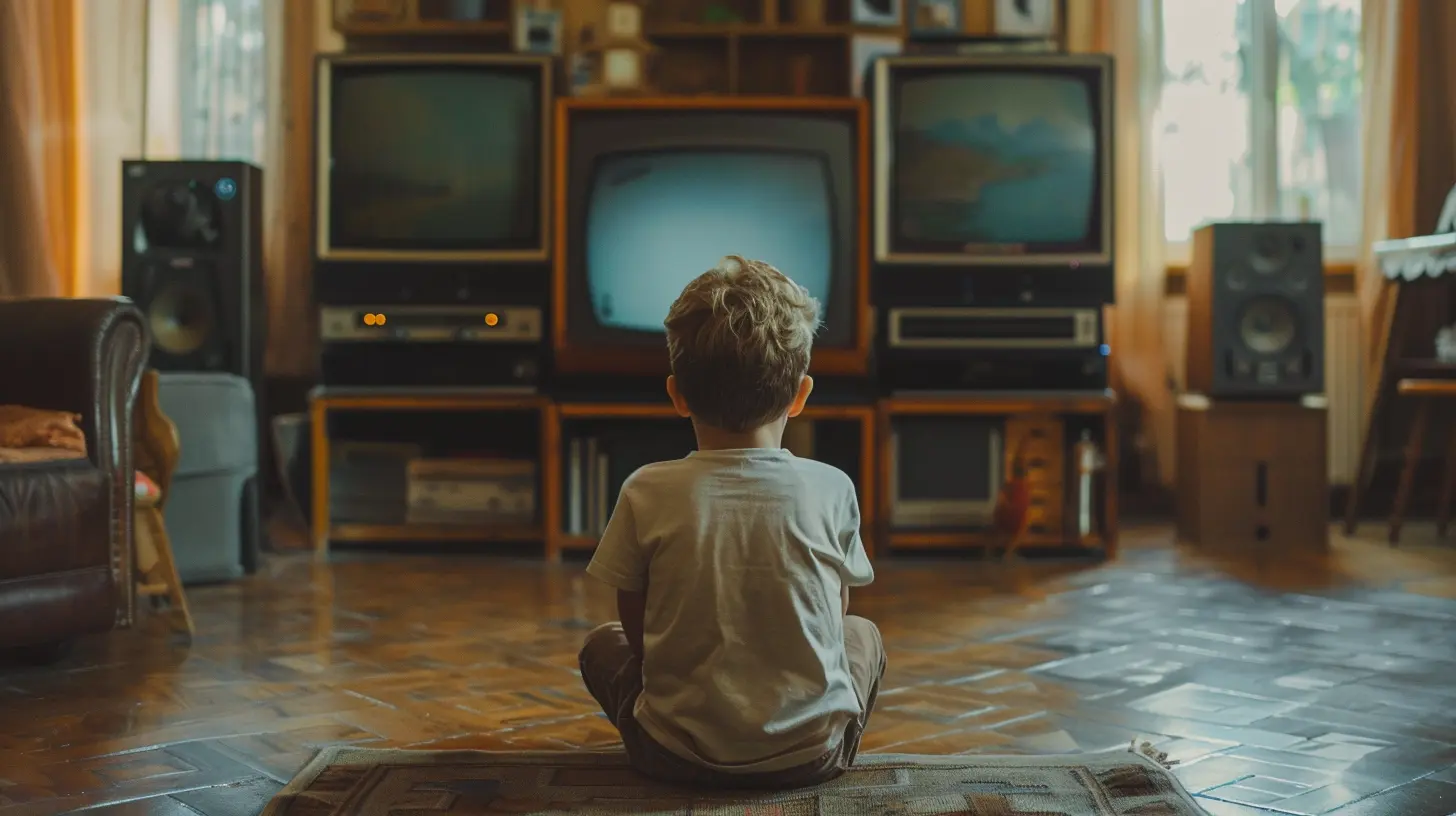The Hidden Effects of Too Much Screen Time on Child Development
27 July 2025
In today's digital world, screens are everywhere—TVs, tablets, smartphones, gaming consoles. Kids grow up surrounded by technology, often glued to a device before they can even walk! While screens offer entertainment and learning opportunities, too much screen time can have serious, hidden effects on a child’s development.
As parents, we often wonder: Is my child spending too much time on screens? The short answer? Probably. But don’t worry, you’re not alone in this struggle. Let’s dive into the surprising ways excessive screen time can impact children and what you can do about it. 
1. Delayed Social Skills Development
Picture this: A group of kids sitting together, but instead of talking, they’re all staring at their devices. Sound familiar?Excessive screen time can take a toll on social skills. When kids spend more time watching YouTube or scrolling through apps than interacting with real people, they miss out on crucial face-to-face communication.
Without enough real-world interaction, children may struggle with:
- Reading facial expressions and body language
- Maintaining eye contact
- Holding conversations
- Building empathy
Screens can’t replace the authentic human connection kids need to develop socially. If they spend more time texting emojis instead of expressing emotions in real life, they may find social interactions awkward and challenging. 
2. Sleep Disruptions and Night Owl Syndrome
Ever wonder why your child is wide awake at midnight despite your best efforts to enforce bedtime? Screens could be the villain in this bedtime battle.The blue light from screens suppresses melatonin—the hormone responsible for sleep. This makes it harder for kids to fall asleep and stay asleep. The result?
- Tired, cranky mornings
- Difficulty concentrating in school
- Increased risk of anxiety and stress
A simple rule of thumb: No screens at least an hour before bedtime. Instead, swap out the screens for a bedtime story or some relaxing music to help them wind down. 
3. Increased Risk of Obesity and Poor Physical Health
Remember the good old days when kids ran around outside until the streetlights came on? Nowadays, many kids spend hours sitting in front of screens, leading to a sedentary lifestyle.Lack of physical activity can result in:
- Weight gain and obesity
- Poor posture
- Weak muscles and reduced endurance
When kids spend more time tapping on a screen than running at the park, their overall physical health takes a hit. Encouraging outdoor play, sports, or even fun indoor activities like dance or yoga can help balance screen time with movement. 
4. Shortened Attention Span and Reduced Focus
Does your child seem restless, easily distracted, or struggle to complete tasks? Excessive screen exposure might be to blame.Fast-paced videos, non-stop notifications, and endless scrolling can wire kids’ brains to crave constant stimulation. This makes it harder for them to focus on slower-paced tasks like:
- Reading a book
- Doing homework
- Listening attentively in class
Over time, too much screen time can lead to attention span issues similar to ADHD symptoms. To counteract this, try:
- Setting limits on screen time
- Encouraging activities that require focus (puzzles, board games, reading)
- Teaching mindfulness and patience through activities like gardening or art
5. Emotional and Behavioral Changes
Ever noticed how cranky or moody your child gets after too much screen time? That’s not a coincidence.Excessive screen use can affect emotional well-being, sometimes causing:
- Increased irritability and mood swings
- Higher levels of anxiety or depression
- Difficulty managing frustration
Social media and video games, in particular, can heighten emotional responses. Kids may become overly sensitive to online interactions, comparing themselves to others, or even addicted to the dopamine rush of gaming achievements.
A good way to help? Encourage real-world hobbies, face-to-face socialization, and time spent in nature to reset their emotional balance.
6. Impact on Creativity and Imagination
Screens provide endless entertainment, but they can also dull creativity. When kids passively consume content rather than creating their own fun, their imagination takes a backseat.Think about it—when was the last time your child built a fort out of blankets or made up their own story instead of watching one on YouTube?
Over-reliance on screens can:
- Reduce imaginative play
- Limit problem-solving skills
- Stifle curiosity and exploration
To boost creativity, encourage hands-on activities like:
- Drawing and painting
- Storytelling and role-playing
- Building things with LEGO or playing with clay
Let their imagination run wild—no app required!
7. Delayed Language and Communication Skills
Babies and toddlers learn language through interaction—listening, watching facial expressions, and responding to real human voices. But when screens replace these interactions, language development can slow down.Studies show that excessive screen time can:
- Reduce vocabulary development
- Delay speech in toddlers
- Affect pronunciation and sentence formation
Instead of handing over a tablet, engage in meaningful conversations. Narrate what you’re doing, ask open-ended questions, and read books together to build strong language skills.
8. Reduced Problem-Solving and Critical Thinking Skills
In a world where answers are just a Google search away, critical thinking is taking a hit.Screens, especially interactive games and apps, offer instant gratification. Kids get used to quick solutions rather than figuring things out on their own. This can lead to:
- Poor problem-solving skills
- Difficulty thinking critically
- Reduced patience for challenging tasks
Encourage activities that require deep thinking, such as:
- Puzzles and strategy board games
- Science experiments
- DIY projects and building kits
These activities help kids develop problem-solving skills in a fun, engaging way.
Finding the Right Balance: Screen Time Tips for Parents
Now that we’ve uncovered the hidden effects of too much screen time, what can you do to create a healthy balance?1. Set Clear Limits – The American Academy of Pediatrics recommends no more than 1 hour of screen time a day for kids aged 2-5, and consistent limits for older kids.
2. Lead by Example – If you’re glued to your phone, your child will follow suit. Model healthy screen habits.
3. Encourage Screen-Free Activities – Engage your child in outdoor play, reading, and creative hobbies.
4. No Screens at Mealtime & Bedtime – Make mealtimes gadget-free and prioritize sleep-friendly habits.
5. Use Educational Screen Time Wisely – Not all screen time is bad! Opt for high-quality, educational content.
Final Thoughts
Screens are here to stay, and that’s okay! The key is finding a balance. While too much screen time can have hidden effects on child development, mindful usage and setting limits will help kids grow into well-rounded, creative, healthy individuals.So, the next time your child asks for more screen time, consider swapping it for a family board game, a nature walk, or even a simple conversation. Their development—and your sanity—will thank you later!
all images in this post were generated using AI tools
Category:
Limiting Screen TimeAuthor:

Karen Hurst
Discussion
rate this article
2 comments
Thalyn McCarthy
In our digital age, the allure of screens often overshadows the essential human experiences that nurture a child's development. By recognizing the subtle, long-term impacts of excessive screen time, we can foster deeper connections and create environments that prioritize emotional intelligence, creativity, and genuine interaction.
November 14, 2025 at 3:28 PM

Karen Hurst
Thank you for highlighting this crucial issue. Striking a balance between screen time and meaningful interactions is vital for nurturing well-rounded development in children.
Duke McInerney
This article truly opened my eyes. I underestimated screen time's impact on my child's development. It's time to reassess our family routines.
July 28, 2025 at 4:05 AM

Karen Hurst
Thank you for your thoughtful comment! I'm glad the article resonated with you and prompted reflection on family routines.


